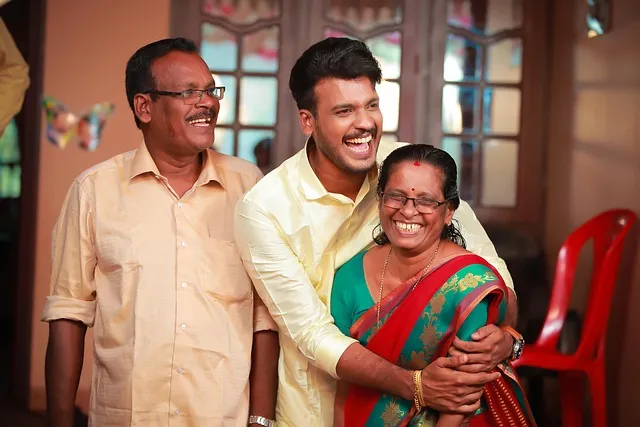Building resilient families is a multi-faceted process requiring a deep understanding of each family's unique dynamics and strengths. Kaiser Marriage and Family Therapists specialize in cultivating family resilience by helping them recognize and harness inherent adaptiveness and recovery capabilities. They promote healthy attachment styles, enhance communication, create safe emotional expression spaces, and address underlying issues using trauma-informed care approaches. Premarital counseling prepares future parents to establish supportive environments for their children's secure attachment figures. Therapy sessions with Kaiser therapists facilitate open communication in structured settings, employing techniques like cognitive-behavioral or systemic family therapy. Online therapy offers flexibility, addressing external stressors like mental health disorders. Collaborative approaches, including family meetings, Emotional Freedom Technique (EFT), and positive psychology interventions, enhance emotional well-being. Family trauma healing retreats provide immersive supportive environments for collective coping and challenge overcoming, boosting long-term resilience.
Building resilient families is a key to thriving in today’s complex world. This article, penned by a Kaiser Marriage and Family Therapist, explores the essential role of therapy in cultivating strength and adaptability within households. We delve into understanding family resilience, the specific techniques therapists employ, and practical strategies for fostering connections while navigating challenges as a united front. Discover how therapy empowers families to become more resilient, enhancing their ability to overcome obstacles and flourish.
- Understanding Family Resilience: A Kaiser Marriage and Family Therapist's Perspective
- The Role of Therapy in Building Strong Family Connections
- Strategies for Fostering Resilience and Overcoming Challenges Together
Understanding Family Resilience: A Kaiser Marriage and Family Therapist's Perspective

Building resilient families is a complex process that requires understanding and nurturing the unique strengths and dynamics within each family unit. A Kaiser Marriage and Family Therapist brings a valuable perspective to this field, emphasizing the importance of recognizing and cultivating family resilience. This involves helping families identify their inherent capabilities to adapt, recover, and thrive despite challenges or traumatic experiences.
Resilience is not solely about overcoming adversity but also about fostering healthy attachment styles, enhancing communication, and providing safe spaces for emotional expression. Kaiser network therapists often employ trauma-informed care approaches, which are crucial in addressing underlying issues that may hinder family bonding and cohesion. Premarital counseling benefits extend beyond romantic partnerships; they prepare future parents to create supportive environments, ensuring their children grow up with secure attachment figures, a cornerstone of long-term resilience.
The Role of Therapy in Building Strong Family Connections

Therapy plays a pivotal role in fostering strong family connections by providing a safe, structured environment for open communication. Kaiser marriage and family therapists are trained professionals who guide families through complex dynamics, helping them navigate challenges with increased understanding and empathy. Through various therapeutic techniques, such as cognitive-behavioral therapy or systemic family therapy, these experts facilitate meaningful conversations that strengthen bonds between family members. By addressing underlying issues and promoting healthy expression of emotions, therapy empowers families to build resilience—a key factor in weathering life’s storms together.
In particular, online therapy sessions have become increasingly accessible, offering families the flexibility to engage in treatment from the comfort of their homes. This accessibility is crucial for those dealing with demanding schedules or sensitive situations that might make in-person visits challenging. Furthermore, the integration of technology allows for continuity in care, ensuring ongoing support even when families face external stressors like mental health disorders such as borderline personality disorder. By combining professional guidance with a supportive digital platform, online therapy sessions contribute to optimism and resilience building within families.
Strategies for Fostering Resilience and Overcoming Challenges Together

Building resilient families requires a collective effort and a range of strategies to foster optimism and resilience in the face of challenges. A Kaiser Marriage and Family Therapist suggests starting with open communication, where family members feel safe expressing their emotions and concerns. Regular family meetings can be a powerful tool for this, providing a consistent space for discussion and problem-solving.
Encouraging each family member to participate and share their thoughts empowers them to navigate difficulties together. Incorporating practices like the Emotional Freedom Technique (EFT) or positive psychology interventions during these discussions can enhance emotional well-being. Family trauma healing retreats offer an additional supportive environment where individuals can learn coping mechanisms, build on their strengths, and overcome challenges as a unit, ultimately strengthening their resilience over time.
Building resilient families is a journey that empowers individuals to navigate life’s challenges with strength and unity. As highlighted by a Kaiser Marriage and Family Therapist, fostering resilience starts with understanding the unique dynamics of each family. Through therapy, families can strengthen their connections, develop effective communication, and acquire tools to overcome obstacles together. By implementing strategies such as active listening, emotional regulation, and problem-solving skills, parents and children alike can build a supportive network that enhances overall well-being. Investing in family therapy is a proactive step towards creating a resilient and harmonious household, ensuring that each member feels valued and equipped to face future challenges head-on.






